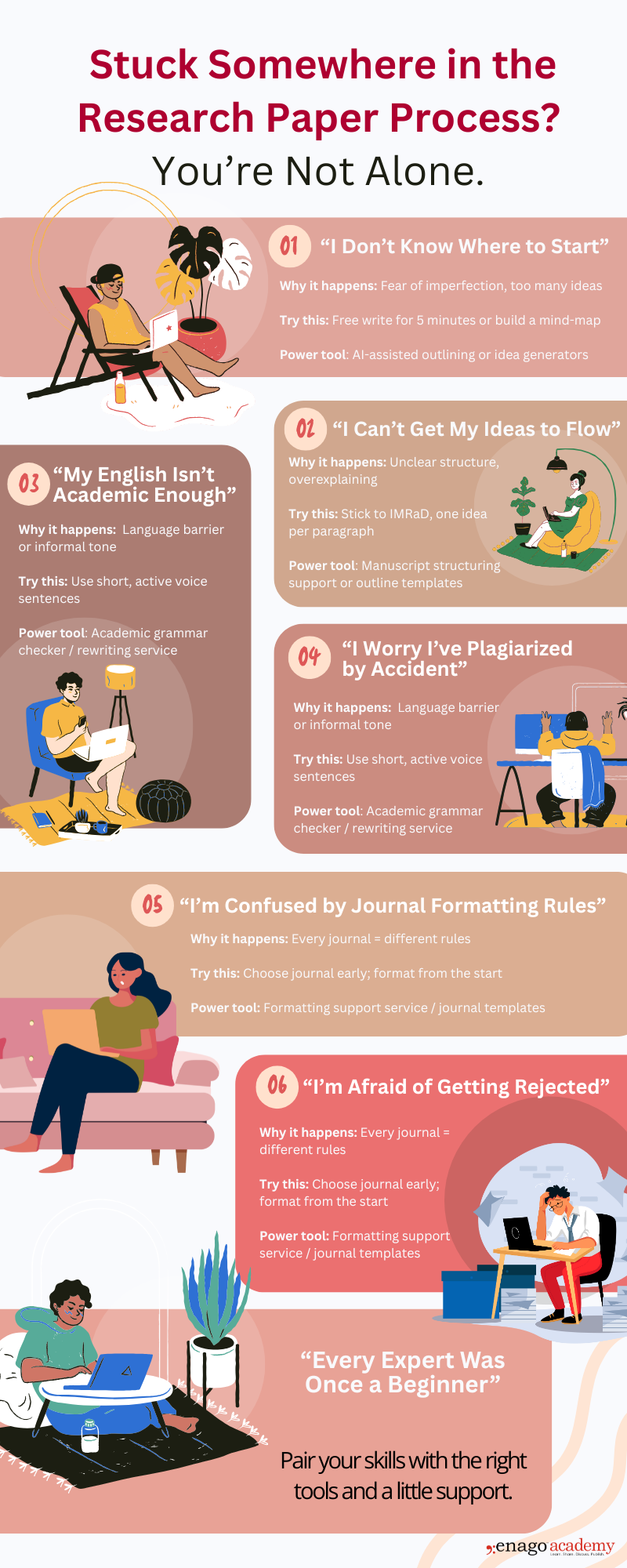Writing a research paper is far more than presenting your data and findings. It is about crafting a cohesive, compelling narrative that communicates the significance of your work to a wider academic audience.
Yet, many researchers encounter hurdles in the writing process—issues that, if unaddressed, can lead to journal rejection. In this article, we will delve into the most overlooked challenges that researchers face and turn these barriers into bridges for publication success.
Why do Research Papers get Rejected?
There are several other factors that could lead to a research paper being rejected for publication. According to a recent study, one of the most overlooked yet frequent reasons for desk rejection is submitting to a journal that is not aligned with the paper’s topic, scope, or audience. Choosing the right journal is essential—not only to reach the appropriate readership but also to meet the editorial team’s expectations.
The below graph depicts other key factors that are attributed to paper rejection. First, having an unclear or weak abstract. If the abstract fails to highlight the novelty and significance of the findings, it may not convince reviewers to consider the full manuscript. The lack of originality or novelty can lead to desk rejection as journals seek submissions that make meaningful contributions and push the boundaries of current knowledge.
Common Reasons for Rejection of a Research Paper

Another common issue is the absence of a clear aim or hypothesis. Without a well-defined purpose, a paper may come across as vague or unfocused, making it difficult for reviewers to assess its value. Similarly, a weak research design—such as flawed methodology, inadequate data, or missing controls—can undermine the study’s credibility and reliability.
Many research papers are rejected due to recurring issues that could be avoided with careful planning and attention to detail. Poor writing and presentation are major red flags, as grammatical errors, unclear arguments, and a disorganized structure can obscure even strong research, reducing its chance of acceptance.
Finally, ethical issues such as plagiarism or improper citation can lead to immediate rejection and may harm a researcher’s professional reputation
By addressing these common pitfalls early, researchers can significantly improve their chances of getting published.
Research Paper Writing Challenges and How to Solve Them
1. Lack of a Clear Research Narrative
One of the most significant reasons papers are rejected is the absence of a coherent research narrative. A well-defined research question is essential as it guides your study, analysis, and conclusion. Without it, the paper lacks direction and fails to engage the reader.
Moreover, poor structural flow and weak argumentation can confuse reviewers and diminish the impact of your findings.
Solution:
- Begin by formulating a focused research question.
- Build your paper around this core idea.
- Use a structured outline to maintain logical flow between sections.
- Ensure each paragraph advances the argument or discussion in a meaningful way.
2. Literature Review and Research Gap Identification
Overloading the reader with too much background information or, conversely, providing insufficient context can obscure your study’s relevance.
Solution:
- Aim for clarity, not quantity.
- Highlight key studies and compare their findings.
- Focus on relevance and point out the gaps your research addresses.
- Connect previously published works to your research goals.
- Try using literature review assistants like Enago Read to simplify review and save time.
3. Ambiguous Writing and Poor Data Presentation
Even with excellent data, poor presentation and unclear writing can hinder comprehension. Common issues include excessive jargons, overly complex sentences, vague descriptions, and ineffective or overloaded tables and graphs can mislead or confuse readers.
Solution:
- Use simple, precise language.
- Avoid unnecessary jargon unless you define it clearly.
- Ensure visuals are well-labeled and directly support your argument.
- Use Free AI content detectors to improve your manuscript.
4. Lack of Proper Structure or not Following Journal Formatting Requirements
Non-compliance with journal guidelines is a surprisingly frequent reason for rejection. Each journal has unique requirements regarding structure, referencing, word count, and formatting.
Solution:
- Always review the journal’s author guidelines before submission.
- Adhere strictly to structural and formatting rules, (Font size, style, spacing, numbering, flow of headings, etc.)
- Check points such as need for structured abstracts, word count restrictions, and suggested reference count before submission.
5. Maintaining Grammar and Style in the Research Paper
Grammatical inconsistencies, awkward phrasing, and inconsistent tone can distract reviewers and lower the perceived quality of your paper.
Solution:
- Utilize grammar-checkers like Trinka AI to spot errors.
- Follow a recognized style guide (e.g., APA, MLA, Chicago) for consistency.
- Create a personal checklist to catch habitual mistakes before final submission.
- Take a break and revisit the manuscript with fresh eyes to check grammatical errors which can be missed.
6. Citing Sources and Avoiding Plagiarism
Improper citation and unintentional plagiarism are serious ethical concerns that can derail a submission. These issues often stem from poor paraphrasing or forgetting to attribute sources.
Solution:
- Use reference management software’s to manage references efficiently.
- Always adhere to the citation style recommended by the journal.
- Instead of copying and paraphrasing the text in the document. Try to read the entire text and then write in your own words. This approach will help you grasp the core message and express it in your own words and ensure that the relevance of the study is conveyed within the context of your research.
- Always cite Primary sources instead of secondary articles such as reviews, editorials, or commentaries.
- Use plagiarism detection tools to cross-check your work before submission.
7. Writer’s Block and Procrastination
Many researchers struggle with starting or maintaining writing momentum. Writer’s block, fueled by perfectionism or overwhelm, can delay progress.
Solution:
- Focus on getting words on the page rather than achieving perfection immediately.
- Draft key bullet points before writing to clarify your thoughts and reduce the pressure of a blank page.
- Share work-in-progress with trusted colleagues or friends for feedback and clarification.
- Switch to another project or writing task to refresh your perspective and reduce the pressure of being stuck on one topic.
- Record your ideas and voice-to-text software. Transcribing these recordings later turns the task into editing rather than the initial creation.
- Break writing into short sprints using techniques like the Pomodoro method (25 minutes of focused work followed by a 5-minute break).
- Use AI writing assistant applications with features that can help with contextual writing.
Whether it’s starting from scratch, polishing grammar, or figuring out where to submit—every researcher hits a wall at some point. We created this visual guide to help you spot the challenge, understand what’s behind it, and overcome it with smart, practical fixes.

Addressing these common pitfalls early in the writing process not only improves readability but also enhances your paper’s chances of acceptance. Every challenge is an opportunity to elevate your manuscript.
If you’re struggling to polish your research paper, consider seeking professional editing support. Expert editors can refine language, improve flow, and ensure your manuscript aligns with journal standards—boosting your confidence and your chances of success.
By tackling these challenges head-on, researchers can transform the daunting task of paper writing into a manageable, even rewarding process. Remember, your research deserves to be read—make sure your paper gives it the platform it needs.










